|
|
|
Sort Order |
|
|
|
Items / Page
|
|
|
|
|
|
|
| Srl | Item |
| 1 |
ID:
108563
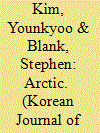

|
|
|
|
|
| Publication |
2011.
|
| Summary/Abstract |
China has clearly emulated Russia's previous example of making loud claims and
increasing military patrols in the Arctic. China will likely become a major player
in Arctic trade routes and become a main destination for goods shipped through
the Northern Sea Route. It is likely that a significant part of future Russian oil
and gas production will ultimately be supplied to China. What are the strategic
implications of China's active involvement in Arctic politics? The Arctic "Great
Game" is often described as a new Cold War between the United States and Russia.
Regionally, the two main protagonists are Russia and Norway. This article makes a
different argument. The Arctic has recently become an issue on the Russo-Chinese,
and possibly Russo-Japanese security agenda. The first goal of this article is to
examine the Arctic policy and strategy of Russia, perhaps the most difficult nation
to understand in terms of Arctic security. The second goal of the article is to
explain how the Arctic has become an issue of concern in Russia's relationship
with China.
|
|
|
|
|
|
|
|
|
|
|
|
|
|
|
|
| 2 |
ID:
100040
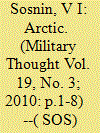

|
|
|
| 3 |
ID:
136982


|
|
|
|
|
| Publication |
Oxon, Routledge, 2015.
|
| Description |
viii, 164p.Hbk
|
| Standard Number |
9781138855991
|
|
|
|
|
|
|
|
|
|
|
|
Copies: C:1/I:0,R:0,Q:0
Circulation
| Accession# | Call# | Current Location | Status | Policy | Location |
| 058161 | 320.09113/SIN 058161 | Main | On Shelf | General | |
|
|
|
|
| 4 |
ID:
147767
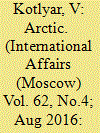

|
|
|
|
|
| Summary/Abstract |
IN RECENT YEARS, the Arctic has been attracting heightened attention in the world due to the intensive study and use of its natural resources by various countries: the oil and gas resources on the mainland and on the continental shelf, the region's biological reserves and the transport capacities of the Russian Northern Sea Route.
|
|
|
|
|
|
|
|
|
|
|
|
|
|
|
|
| 5 |
ID:
191902
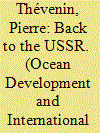

|
|
|
|
|
| Summary/Abstract |
This article analyzes the consequences of the recently declassified Soviet decree No. 331-112 of 27 April 1965 that established, inter alia, the status of the Soviet Arctic straits along the Northern Sea Route with respect to warships’ right of innocent passage. This article argues that the decree, read in conjunction with Article 5.2 of the 1958 Convention on the Territorial Sea and Contiguous Zone and Article 8.2 of the United Nations Convention on the Law of the Sea, establishes a right of innocent passage through the majority of the Russian Arctic straits, which warships can enjoy. Furthermore, this article asserts that the decree calls into question the existence of a customary regime regulating navigation through the Arctic straits.
|
|
|
|
|
|
|
|
|
|
|
|
|
|
|
|
| 6 |
ID:
190520
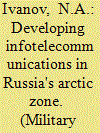

|
|
|
|
|
| Summary/Abstract |
This article explains the problem of infotelecommunications development in Russia's Arctic Zone, analyzing the characteristics of this national problem. Solving it will yield a significant economic and defensive effect. Its urgency, solution, and connection with Russia's economic and defense sectors are explained.
|
|
|
|
|
|
|
|
|
|
|
|
|
|
|
|
| 7 |
ID:
128424
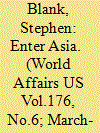

|
|
|
|
|
| Publication |
2014.
|
| Summary/Abstract |
The Arctic, always before on the frigid edges of the international imagination, is becoming a hot topic in world affairs, particularly in Asia, because of its virtually untapped resources and increasing strategic importance. In 2012, the amount of cargo transported through the region more than doubled, and in May 2013 the Arctic Council, traditionally membered by Europe's Nordic countries, along with Russia, Canada, and the US, granted observer status to China, Japan, India, South Korea, Singapore, and Italy, a reminder that climate change is opening the Arctic to wider use and commercial exploitation, especially by Asian interests. Indeed, a Chinese shipping company sent that country's first commercial voyage through the Arctic in September 2013. And Russia is negotiating with Korean shippers about using the Northern Sea Route (NSR) for energy shipments. These developments are already bringing the Arctic and Asian security agendas together, and in the process changing Asia's strategic boundaries and planning.
|
|
|
|
|
|
|
|
|
|
|
|
|
|
|
|
| 8 |
ID:
111693
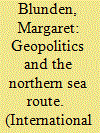

|
|
|
|
|
| Publication |
2012.
|
| Summary/Abstract |
Experimental transit voyages along the Northern Sea Route to the north of Russia are breaking new ground each year and the route is already significant for the export of raw materials from Russian ports. National and corporate interests are now driving Russia's Arctic policy, rather than, as formerly, an exclusive focus on security, and the Russian government has ambitious plans for the development of the route. Future regular transit of the Northern Sea Route between Europe and Asia, at present facing serious obstacles, could be accelerated not only by climate change, but by overload on, or interruptions to, the existing route through the Suez Canal, which passes through some of the world's most volatile regions. Despite the formidable impediments to regular year round transit of the Northern Sea Route, governments of the non-Arctic states with most at stake, particularly Germany and China, appear to be taking no chances, and to be jockeying for influence in the Arctic region. The interests of the non-Arctic trading states, and of the European Union, more inclined to view the Arctic Ocean as part of the 'common heritage of mankind', are however potentially different from those of Russia, and indeed of Canada in respect of the North East passage, both determined to maintain their exclusive national jurisdiction over emerging sea lanes through their territorial waters. Great issues are at stake here. The emergence of new sea lanes has historically impacted heavily on the international balance of power. Where the merchant fleets go, navies will shortly follow.
|
|
|
|
|
|
|
|
|
|
|
|
|
|
|
|
| 9 |
ID:
172433
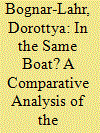

|
|
|
|
|
| Summary/Abstract |
In the field of Arctic shipping, Canada and the Russian Federation have enacted extensive unilateral national regulations cognizant of Article 234, UN Convention on the Law of the Sea. On the global level, both states have been important actors in negotiating the International Maritime Organization’s mandatory Polar Code, a legal instrument with implications for regulations at the national level. This article compares and contrasts the approaches, positions, and arguments of Canada and Russia especially regarding national systems to control navigation and vessel-source pollution. The results suggest different emphases stemming from the two states’ political and economic realities and capacities.
|
|
|
|
|
|
|
|
|
|
|
|
|
|
|
|
| 10 |
ID:
140743
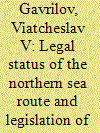

|
|
|
|
|
| Summary/Abstract |
This article addresses the legal status of the Northern Sea Route (NSR) from a historical perspective and in accordance with the current Russian legislation and provides some answers to the questions of how the legal status of the NSR conforms with the norms of contemporary international law of the sea and, in particular, with the 1982 UN Convention on the Law of the Sea.
|
|
|
|
|
|
|
|
|
|
|
|
|
|
|
|
| 11 |
ID:
188489
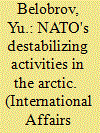

|
|
|
|
|
| Summary/Abstract |
AFTER nearly three decades of constructive cooperation in the Arctic between Russia and NATO member states, the region is returning to the era of tough confrontation. NATO's leading countries have a growing irrepressible desire to dominate the entire Arctic as increasingly rapid ice melt in the region caused by global climate change makes its seas more navigable and opens new opportunities for tapping its rich natural resources. In pursuit of this goal, NATO countries are ramping up their military activity and offensive potential, creating a major threat to Russian interests in the region, the lion's share of which is under Russian sovereignty, as even Western experts acknowledge.
|
|
|
|
|
|
|
|
|
|
|
|
|
|
|
|
| 12 |
ID:
122256
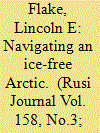

|
|
|
|
|
| Publication |
2013.
|
| Summary/Abstract |
Climate change is set to elevate the debate over maritime navigation and coastal state jurisdiction in the Arctic Ocean. Russia, with its centuries-old claim over the Northern Sea Route, is likely to increasingly clash with proponents of navigational freedoms as receding ice makes Arctic seaborne logistics viable. Moving forward, Moscow's Arctic posture may resemble its Near Abroad intransigence, particularly when dealing with foreign navies operating in Russia's self-proclaimed area of control. Lincoln E Flake reflects on how the issue of freedom of navigation could pose a greater risk to Arctic stability than the better known disputes over seabed claims and competition for hydrocarbon resources.
|
|
|
|
|
|
|
|
|
|
|
|
|
|
|
|
| 13 |
ID:
162809
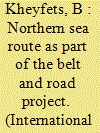

|
|
|
|
|
| Summary/Abstract |
The Northern Sea Route (NSR) may become a significant Russian contribution to China's One Belt, One Road project due to the shared interests of Russia and China. Russia definitely needs the NSR much more than any of the potential other participants in Belt and Road. The NSR plays a key role in the development of vast Russian territories that are largely uninhabited but possess tremendous reserves of timber, gas, oil and various other minerals and extensive sea areas with large fish resources. According to some estimates, the NSR connects areas that make up nearly 70% of Russia's territory.1 The NSR also has national security significance that is hard to overestimate. All this makes the NSR a strategic asset for Russia.
|
|
|
|
|
|
|
|
|
|
|
|
|
|
|
|
| 14 |
ID:
106764
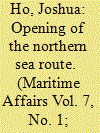

|
|
|
| 15 |
ID:
159318
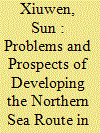

|
|
|
|
|
| Summary/Abstract |
The article discusses problems of developing the Northern Sea Route (NSR) in connection with realizing China's Belt and Road initiative. It also reviews recent studies devoted to assessing the prospects of the NSR and the possibilities of interlocking it with this initiative. Since realizing the NSR's potential demands not only solving problems associated with jurisdiction, management, economic competitiveness, and environmental protection, but seeking effective mechanisms of coordinating the strategic interests of the major powers in the region as well, the author believes interlocking the NSR with the Belt and Road initiative is becoming ever more realistic.
|
|
|
|
|
|
|
|
|
|
|
|
|
|
|
|
| 16 |
ID:
164061
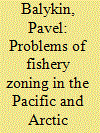

|
|
|
|
|
| Summary/Abstract |
This article notes the importance of food security and the serious lag of this industry in recent years. This, according to the author, is largely due to miscalculations in the modern scheme of fishery zoning. The article proposes to update the fishery zoning of the country's seafood supply as a factor of modern methods of marine spatial planning. It also touches on the problems of international rivalry and interaction, including the development of the Northern Sea Route and the prospects of its use in the context of the Maritime Silk Road project of the 21st Century.
|
|
|
|
|
|
|
|
|
|
|
|
|
|
|
|
| 17 |
ID:
126098
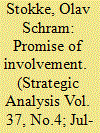

|
|
|
|
|
| Publication |
2013.
|
| Summary/Abstract |
In late 2012, the first liquefied natural gas tanker to sail through the Northern Sea Route reached its destination in Japan, carrying gas from a Euro-Arctic offshore field. Only months earlier, a Korean-owned naval architecture and engineering company had won the contract for designing the long-awaited new icebreaker for Canada's coast guard, 1 and China had completed its fifth Arctic marine survey from its own ice-capable research vessel. The same year saw India apply for permanent observer status in the Arctic Council, a high-level forum for addressing Arctic issues, thus joining an expanding group of Asian applicants that already counted China, Japan, Korea and Singapore. The recent surge in Asian interest in the Arctic has been followed closely by the states of the Arctic region: Should they worry about this development, or see it as an asset in their efforts to manage the rapid changes underway in the Arctic?
|
|
|
|
|
|
|
|
|
|
|
|
|
|
|
|
| 18 |
ID:
186367
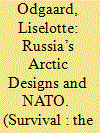

|
|
|
|
|
| Summary/Abstract |
The war in Ukraine has made Russia’s Arctic strategy of developing the Northern Sea Route more important. Moscow and Beijing share interests in redirecting Russian energy and mineral exports towards China and expanding infrastructure along Russia’s Arctic coastline to connect the Northern Sea Route with China’s Polar Silk Road. Chinese investments and technology are necessary to realise the sea route’s commercial potential and protect Russia’s Arctic security interests. Supply lines between North America and Europe traverse the High North. China is supporting a strengthened Russian defence posture by expanding cooperation on intelligence, surveillance and reconnaissance. This will help Russia challenge NATO along both China’s coastline and Russia’s borders with NATO. Accordingly, NATO needs to devise a strategy that recognises the interdependence of its eastern and northern flanks.
|
|
|
|
|
|
|
|
|
|
|
|
|
|
|
|
| 19 |
ID:
169151
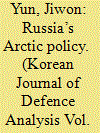

|
|
|
|
|
| Summary/Abstract |
The greatest change resulting from the Arctic thaw is the activation of Arctic
resource development and the development of Arctic ports. In this regard, Arctic
governance and Arctic regimes arising from climate change, global warming,
resource development, Arctic Route, logistics, maritime boundary delimitation,
environmental and biodiversity conservation and sustainable development are
underway, and the activities of the Arctic Council (AC). Russia is now investing
funds in a comprehensive approach to the collection of information on waterways,
hydro-meteorology and maps and the strengthening of safety measures for the
prevention of oil spills. In light of this, Russia has proceeded with long-term use
and development of the Northern Sea Route despite the constraints of the Arctic
environment and conditions. It is also calling for government cooperation with
business entities in the development of a nuclear-powered icebreaker fleet. In
particular, Russia has played the most active role in Arctic development such as
resource development and military base construction with a focus on icebreakers.
In this context, the main purpose of this article is to examine sustainable Arctic
development policies focusing on the characteristics of Arctic policies and the status
of Arctic ports and railway and road networks under Vladimir Putin’s presidency.
|
|
|
|
|
|
|
|
|
|
|
|
|
|
|
|
| 20 |
ID:
151258
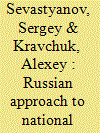

|
|
|
|
|
| Summary/Abstract |
This article is devoted to the research of military and economic aspects of national security of the Russian Federation in the Arctic. The authors consider national riches as the country`s main security object in the region. This work describes basic measures undertaken by Moscow over recent years to improve Russia`s defense capabilities as well as main components of its economic policy in the Arctic. It also analyses positive and negative factors that could influence implementation of Russia`s energy and infrastructure projects in the Arctic. Finally, in the context of the so-called “Russian pivot to the East” the authors assess prospects of Russian cooperation with Asia-Pacific nations (especially China, South Korea and Japan) in the Arctic.
|
|
|
|
|
|
|
|
|
|
|
|
|
|
|
|
|
|
|
|
|